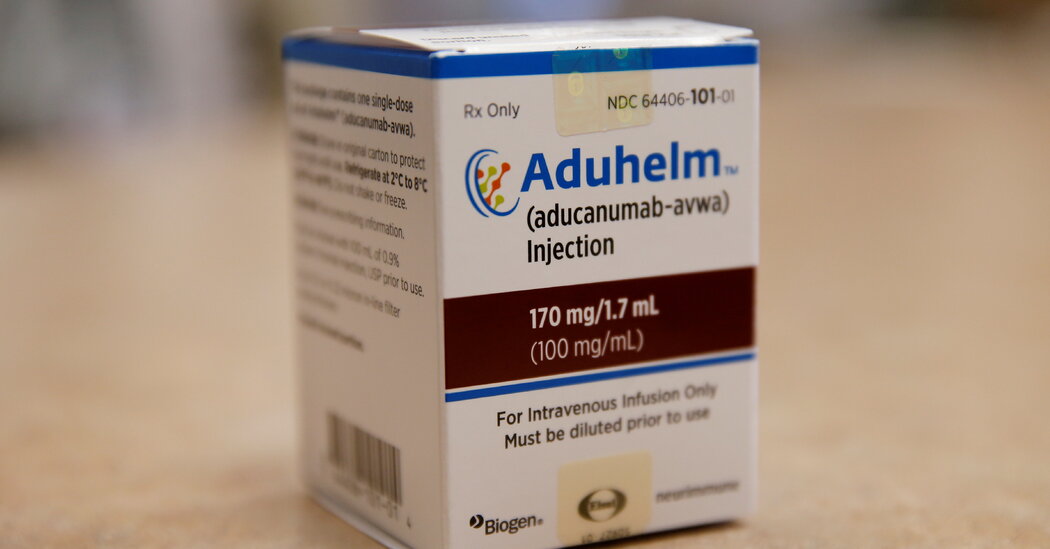If the preliminary decision is finalized this spring, it would sharply limit the number of patients who use the expensive drug.
Medicare officials have decided that the federal health insurance program should only cover the controversial new Alzheimer’s drug Aduhelm for patients who are participating in approved clinical trials. If the preliminary decision is finalized later this year, it would significantly limit the number of patients who could use the expensive drug.
The decision, reached after lengthy deliberations, was released on Tuesday by the Center for Medicare and Medicaid Services, or C.M.S. It said that coverage should be provided for patients in “C.M.S. approved randomized controlled trials” and trials supported by the National Institutes of Health. “All trials,” it said, “must be conducted in a hospital-based outpatient setting,”
The agency added that Aduhelm or other similar drugs for Alzheimer’s that are provided outside of these trials “are nationally non-covered.”
“C.M.S. has proposed an evidence-based coverage policy after experts reviewed all relevant publicly available evidence and feedback received from stakeholders,” said the C.M.S. administrator, Chiquita Brooks-LaSure, in a statement.
In a statement, Biogen, which makes the drug, said that the agency’s position “denies the daily burden of people living with Alzheimer’s disease” and that the clinical trial requirement “will exclude almost all patients who may benefit.”
Medicare’s coverage decision is considered pivotal to the future of Aduhelm, which is priced at $28,200 a year per patient. Roughly 80 percent of the 1.5 million Americans who have the type of condition the F.D.A. approved the drug to treat — mild Alzheimer’s-related cognitive decline — are old enough to receive coverage under Medicare.
For the next 30 days, C.M.S. will have a public comment period on the preliminary decision, and the agency is expected to announce its final decision about covering the drug by mid-April.
The fact that Medicare is conducting an extensive review of Aduhelm is itself unusual. The program almost always pays for F.D.A.-approved drugs, at least for the medical conditions designated on their label, health policy experts said.
Biogen initially priced the drug at $56,000 a year, but slashed the price in half last month after months of weak sales. Before Biogen’s price cut, Medicare’s actuarial division, acting without knowing what the coverage decision would be, imposed one of the biggest-ever increases in Medicare Part B premiums for 2022, partly driven by the possibility of Aduhelm coverage.
After Biogen’s price cut, advocacy groups for Alzheimer’s patients urged C.M.S. to lower the premium increase. On Monday, the secretary for health and human services, Xavier Becerra, said that he was instructing C.M.S. to re-examine the premium hike “given the dramatic price change of the Alzheimer’s drug, Aduhelm.”
Aduhelm was approved by the Food and Drug Administration in June in a decision vigorously criticized by many doctors and Alzheimer’s experts because clinical trial results showed it had significant safety risks and unclear benefit to patients.
Congress is investigating whether the F.D.A. worked too closely with Biogen and why Aduhelm was approved despite strong objections from some senior F.D.A. officials and the agency’s independent advisory committee.
So far, only a small number of patients — a fraction of the number Biogen and industry analysts had initially expected — have used Aduhelm, a monoclonal antibody administered as a monthly infusion. Many large American health care systems have declined to offer the drug, citing questions about its benefits and risks.
Medicare officials are supposed to determine coverage based on whether a drug is a “reasonable and necessary” treatment, a phrase that usually “means adequate evidence of improved health outcomes,” said Dr. Sean Tunis, a former official with C.M.S. who is now a senior fellow at the Center for the Evaluation of Value and Risk in Health at Tufts Medical Center.
Medicare’s decision on Aduhelm will also establish standards for evaluating several similar Alzheimer’s drugs in the pipeline.
The F.D.A. itself acknowledged in its approval of Aduhelm that there was insufficient evidence it would help patients. Instead, it greenlighted the medication — the first new treatment for Alzheimer’s in 18 years — under a program called “accelerated approval,” which allows authorization of unproven drugs for serious diseases with few treatment options if the drug affects a biological mechanism in a way considered “reasonably likely to predict clinical benefit.”
The F.D.A. said it based accelerated approval on Aduhelm’s reduction of a protein, called amyloid, that clumps into plaques in the brains of people with Alzheimer’s. But many Alzheimer’s specialists say that extensive research has shown little evidence that reducing amyloid slows cognitive decline. The F.D.A. also required Biogen to conduct another clinical trial to determine if the drug provided any evidence of benefit. In the years it will take for that trial to be completed, Aduhelm will be available to patients.





























